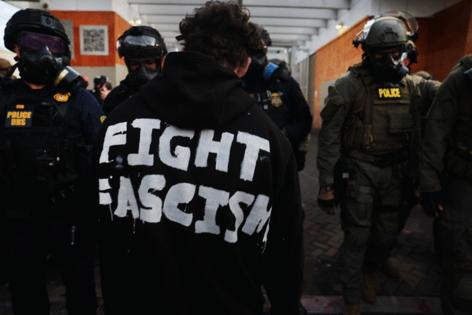Editorial: American cities have issues. Troops won't solve them
Published in Op Eds
As the White House threatens to send the National Guard into more U.S. cities, its rationale seems to vary by place — and by day. In some instances, it’s to fight crime. In others, it’s to protect Immigration and Customs Enforcement officers. Either way, it’s a bad idea: To the extent those problems are legitimate, they’re better handled by local police departments, in partnership with state and federal law enforcement agencies.
To justify the deployments, the administration has portrayed targeted cities as anarchic hellscapes that can only be pacified by military intervention. Such claims are wildly overstated. When the president referred to Portland, Oregon, as “war-ravaged,” it came as news to residents, who have made endless jokes about riots over discontinued granola bars and flannel shortages.
Courts seem equally skeptical. A federal judge in Portland temporarily blocked the deployment of troops to the city, calling the government’s argument “untethered to the facts.” The administration has run into a similar roadblock in Chicago.
Unfortunately, while the protests in Portland have been small and contained, their presence outside the city’s ICE facility has led to instances of clashes, tear gas deployments and arrests. Whether the White House or the conservative influencers who have descended upon the city are seeking to provoke confrontations can be debated.
What’s unassailably clear is that the more images of such unrest that Americans see, the more public support there will be for troop deployments — and the greater the administration’s chances of withstanding legal challenges. An appeals court looking at the Portland case seemed reluctant to question the president’s moves given sporadic cases of violence.
Protesters would be wise to heed local Democratic leaders, who have been urging them to avoid unnecessary confrontations. In Oregon, Governor Tina Kotek, Portland’s mayor and other officials have been singing the same sensible refrain: “Don’t take the bait.”
While the Supreme Court will eventually have the final word on these and other cases, Democratic leaders should also acknowledge that Republicans have been right to criticize their failures to uphold public safety. Too many elected officials, including prosecutors, have ignored criminals who commit property crimes, only to see them later engage in even more serious crimes. That willful blindness carries tragic consequences, and it’s one reason why Democrats have seen their brand of politics end up “in the toilet,” as one party consultant put it.
The continued effort by many on the left to “define deviancy down,” as New York Senator Pat Moynihan warned more than three decades ago, has created an opening for the federal government to step in. Still, deploying uniformed troops only risks making disorder worse and heightens the likelihood of riots and violence. It wastes taxpayer dollars and tarnishes the military’s prized reputation for staying above partisan politics.
To reduce crime in cities, the White House should instead be working with Congress to offer more support to overstretched local police departments. And if more protection for ICE agents is needed, federal agencies should cooperate with state and local police to provide it.
Keeping National Guard troops off city streets should be a bipartisan priority. So should empowering local police departments with the tools they need to enforce the law. Democrats and Republicans, and both ends of Pennsylvania Avenue, ought to find common cause in doing both.
____
The Editorial Board publishes the views of the editors across a range of national and global affairs.
©2025 Bloomberg L.P. Visit bloomberg.com/opinion. Distributed by Tribune Content Agency, LLC.
























































Comments